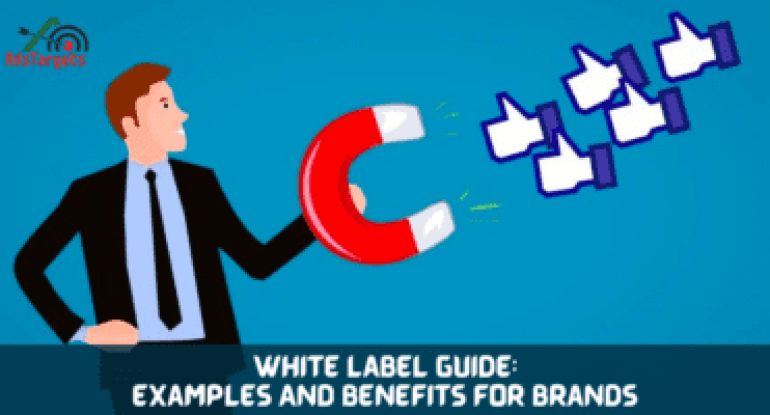Okay, let me tell you an interesting story about two French guys who traveled to Shenzhen and discovered that they could source very cheap white label mobile phones.
At that time, the French market lacked a supply of middle category phones. They bought the brandless phones and rebranded them under the name Wiko.
Three years after, Wiko phones were the second most sold items in France. Today, they are leading in various countries in Africa and the Middle East as well.
The funny part of this story is that the company (Wiko) was ultimately bought by the phone manufacturer.
So it went from producing white labels to owning its successful brand.
I told you this story just to give you a faint picture of what the White label means, however, you deserve to know more than just having an idea about this marketing model.
In this article, I will go in-depth to uncover everything you need to know about the white label, its meaning; how it works; what businesses need White Label Solutions in their marketing; and why brands leverage White Label solutions.
Table of Contents
ToggleWhat is White Label?
White labeling is when a product or service removes its brand from the end product and instead uses the branding requested by the buyer.
For instance, If you go to a grocery store such as Amazon, you will notice that you can buy all sorts of products that are sold under the Great Value brand.
Does this mean that Amazon produces all of those products? No way! They simply have various companies that already are providing those products and are willing to put the product in Great Value packaging rather than their own.
So when you go to Amazon and pick up a Great Value product, take a look around, the brand that is providing the white-labeled Great Value product could also have the product sitting on the same shelf in its packaging at a higher cost.
This holds the same for services, for example, when you plan to launch a new tech product on the market, especially such a complicated one like an ad network, there is always a risk that it won’t work as well as competitive solutions.

White Label and How It Works?
White labeling is closely similar to drop shipping, in that the manufacturer of the product you are selling sells it to you for a cut-price than you will sell it for.
You are buying the product from a manufacturer to sell it as yours, at any price you want.
However, the products are sold under your brand’s name not under the brand name of the producer. You are marketing the products exclusively as yours.
This goes the same for white label services as well. You are charging your customers more for your service than you are paying another company to get it.
White label services should not be confused with contracting because of quality. An outsourced service by itself is normally less costly and for a reason.
A white label service is managed by contract, managed by your company. You are practically outsourcing client work, but to a trusted partner that has agreed to offer your quality and brand of service for an agreed-upon rate because your success translates to theirs.
Why a White Label Solution?
As a business owner with a business problem, your first instinct may be to try do-it-yourself solutions. After all, that is what entrepreneurship is all about.
Right but you are wrong, you don`t always have to try to do it yourself especially when your methods are not sure to produce the desired result.
In many cases, building a branded solution from scratch to meet the exact specifications of your business can be a setup for failure, you don`t want that. That’s because building your solution can lead you to:
#1. Reinvent the wheel, making similar mistakes that others before you have already made, and mastered the path going forward.
#2. Drasticallyslow down your time to market, as you try to troubleshoot and improve your learning curve outside your core competency.
#3. Overspend money developing tools and solutions that exist already in other formats.
#4. Miss out on resources and specialties in the specific areas where you need a focused solution.
These pitfalls are avoidable when simply opting for a white label solution, rather than building one yourself from the scratch.
Under this model, the manufacturer can focus on finding cost-effective ways to make the product, without worries about the product’s marketing.
White label solutions work well for everything from cereal to tickets, I mean everything. Grocery stores sell cereal and other products with their brand name at a discount to other brands.
Similarly, ticket resellers can manage their ticket inventory more successfully through a white label solution. This also improves distribution so that fans have more choices in where they can purchase tickets.
if the above explanation has not buried your doubt about the benefits of white labeling, then let me narrow the points down to fewer but more concise words.
#1. It’s quick and easy to brand.
White label solutions offer advantages if you are considering ways to add new features to your business.
They are generally fully integrated and ready-made, which makes branding very easy. As the reseller, you will be free from worries about needing to spend time and money on research or development.
You can add your branding and identity, and get back to business.
The extra months that it takes to develop your solution can force customers to look elsewhere for solutions.
You can avoid this with a prepackaged solution that meets their needs immediately.
#2. It saves you time and money.
Developing a solution from scratch takes a large amount of financial and human resources — not to mention time.
While a custom solution may seem at the outset to be the best option, you may quickly find that the effort derails internal business processes and creates holes in your bank account.
Even if you think you can build it yourself, it’s vital to factor in time for marketing. Remember the time it takes for architecture, building, designing, and testing the solution.
If you need fast deployment, rattling through any of these steps can leave you even further behind.
When time is of the essence and you need to be fast, investing in an existing solution may be more cost-effective for you.
#3. It enables you to focus on your business’s Major competency.
In many cases, the solutions that businesses hope to build themselves fall far outside of their areas of specialization.
It’s not smart to stretch your resources and luck to do something that doesn’t fit within your major competencies.
Be sure to look carefully at the solution you need and compare it to your available resources to help you decide if a white label solution would help you reach your goals more successfully.
Prepackaged solutions offer an opportunity to trust the experts in the specific space you are focused on, and avoid making the same mistakes that others have made when they started the journey.
#4. Designed to Succeed
Your white label partner is purposeful to watch and help you succeed since your success will ultimately be their success.
To achieve this, they will support you to keep growing and selling your business in any way.
This includes support, training, and resources to ensure you are up to the minute about your software and vital marketing resources to advertise your services.
What Are White Label Companies?
The companies that manufacture white label products can be considered third parties rather than the company selling the product.
The optimal division between roles should not become the sole responsibility to carry out all tasks from manufacturing to marketing independently.
Based on the capabilities and specialties, one firm handles the product’s manufacturing, while another company plans to market the product successfully, and the third firm is focused on promotional strategies.
Private label brands are free of any promotional costs. A convenience store offer can result in lower transportation costs on average, thereby enabling the business to profit by gaining economies of scale when it comes to distribution.
Because transportation costs are lower, retailers can sell the product at lower white-label pricing and make greater profits.
Private labels have earned international recognition, concluding that final consumers are becoming more aware of the price and less loyal to brands they admired before.
White Label Examples
If you go to wholesale markets in China, you can find a lot of products with no brand for a minimal price. You can then buy and resell them directly or talk to the factory to add your brand to the product.
A good example is the Wiko mobile phone brand as I mentioned at the opening of this article. Here are a few other examples of products you can find in open-label:
#1. Coffee
Coffee is a very popular home consumable item to sell, and it is sold using an open-label selling standard.
#2. T-shirts
T-shirts are a very sought-after category of products in every market. It’s easy to design your custom T-shirts, however, contracting out production to white-label companies focuses on branding and sales.
#3. Mugs
Similar to t-shirts, you can offer customized cups. But, you must get the products from a white-label company.
Using a white-label company, you can use your company’s logo, customized designs, and unique packaging.
#4. Cosmetics
A leading example here is Kylie Jenner’s brand, manufactured by the private brand Seed Beauty, which also makes beauty products for ColorPop. The branding is different; however, the prices are high for Kylie’s brand.
#5. Yo!Coach
Yo!Coach is a digital tutoring and consulting platform by FATbit Technologies. As a white label product, it earned popularity during the COVID-19 pandemic when the demand for distance learning solutions surged.
For tutoring, it has highlights like shared workspace, schedule management, and language expertise.
Despite being a white label, both these aforementioned solutions are completely customizable and come with one year of free-of-charge technical support.
This could be the reason behind their success.
I would recommend you go with FATbit Technologies, FATbit has launched white label software and services to their customized.
What Is the Best Option for You? Private Labels or White Labels?
If you have ever thought about the difficulties of making your products and branding, you need to be aware that leveraging white label products is simpler.
In reality, if this is your first time selling products digitally, it is possible to invest a considerable amount of money, but you may not make any money from that investment.
In this scenario, working using white labeling is the ideal choice for you. Additionally, this type of solution can save you time and also money.
If you are allowed to sell white products private label is dependent on the products. However, it is clear that choosing a product that already exists and rebranding it can be more straightforward than creating yours.
The choice of private or white label items will largely depend on the particular business. The sellers are looking for less costly products in certain cases, while others want a reliable and popular brand.
What are some super successful startups that have Leveraged white label products?
Entrepreneurs who are willing to take chances tend to achieve more than those who try to play it safe.
Successful companies may be established enough to follow stable business processes, but they are also bold as well as risk-taking could inspire people to purchase a product, and you will build a successful brand.
Business can be Unsuccessful only when the product you have is not good to solve the pain points of the customer.
Successful business happens when people are motivated to buy. This is because a product that consumers love and desire to buy is what creates success.
to climb through the ladder to the top, some startups leveraged white label solutions to grow. below is a list of some of the successful brands:
#1. Yodlee ( A data aggregator and technology company that was later sold for $590M to Envestnet)
#2.Twilio (Twilio offers its communications application program interfaces to companies that need messaging or calling capacity in their apps.
It charges based on usage, so the more popular a platform, the more money Twilio rakes in.
This fee model has performed well, as in the past few years Twilio has racked up several customers that are both high- and low-profile.
Some of the bigger apps that use its services include Uber and eHarmony)
#3. Stripe’s (valued above $5B) new funding makes it a $5 billion brand
For all of these companies, you have used their products without knowing it, perhaps. Yodlee powers Mint.com and several other financial services websites.
Twilio powers the text and calling features of Uber, Lyft, eHarmony, etc.
Stripe powers credit card payments for several of the websites you use today.
#4.McDonald’s has around 36000+ outlets in the World Today
#5. Subway has around 42000+ Outlets in the world
#6. Starbucks has around 24000+ Outlets in the world
#7. CCD has nearly 1500+ Outlets in India
#8. Dominos have nearly 15000+ Outlets in the World.
They all succeeded because they solved a hard problem that companies would rather out contract than solve themselves, but were still core to their business.
They then scaled quickly so that it was always inexpensive to pay them than build it yourself.
What businesses require White Label Solutions?
White Label Solution works almost with any tangible or intangible goods. For example, small bakeries sell the product to big stores at lower prices. The stores sell those baked goods to the buyers under their own logo.
White Label business opportunities for enterprise

White label solutions don’t only work for entrepreneurs and startups, many solutions can help enterprise build out their revenue streams by upselling and cross-selling their customers.
Many enterprise white label business services providers specialize in one major area and dominate their separate markets.
These enterprises can use that authority and massive customer base to upsell clients with additional solutions, and not only boost their revenue, but also improve client retention.
The Vendasta churn research of 100K+ SMBs found that selling an SMB 1 product has a retention rate of scarcely 30 percent after 2 years, but selling that SMB just 1 more product showed an improved retention rate of close to 20 percent.
Here are some white labeling business opportunities for enterprises to explore:
#1. White label agency services: Cover the comprehensive marketing stack of white-label business services from ad campaign management, to social posting, to website design and more with a white-label team that manages the fulfillment for you.
This is a great solution for enterprises as they can include new solutions without having to add to the caseload of their fulfillment team.
#2. White label business opportunity in web hosting: Just like with agencies, web hosting is a good service to add to an Enterprise’s portfolio of solutions because it’s hands-off and a fundamental piece of a business’s marketing strategy.
White-label website hosting can be a great value-add to both small and large business customers, and even assist brand-new businesses to get up and running.
#3. White label business opportunities in listings and reputation management: Listings and reputation management are services that often go without attracting notice, yet are blowing up in terms of SMB ad spend.
Our research found that less than 45 percent of marketing service providers sell these white label business services, yet they are a combined $600 million market.
That means low competition and a massive opportunity. White label listings and reputation can be easily added to take advantage of this, without having to build out extra divisions.
Conclusion
White label means providing sellers the opportunity to launch their own business without having to build special warehouses from the scratch.
If you are paying for the white label privilege, slapping your brand’s name on a product that someone else developed is completely acceptable…and advantageous for many reasons!
A white label legally permits you to place your brand name on a product or service that someone else produced, typically for a nominal fee.
White labeling enables you to offer products and services without having to spend time and money on customizing and developing them yourself.
White label is used extensively throughout most industries, from food service to business marketing.
perhaps you have heard of the business model before but you were not convinced that white label has so many benefits including cost-effectiveness.
Well, we know white labeling and the powers it holds and decided to explain to you in this article how white labeling works and how it can be very useful to you.








